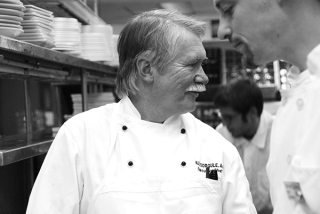
Teach the Trainer – Train the Teacher
03 September 2024Training and teaching must be ongoing for instructors – for those who educate in a classroom and those who teach in a professional kitchen.
By Paul Sorgule, MS, AAC
Feedback & comments: This email address is being protected from spambots. You need JavaScript enabled to view it.
It is true we don’t know what we don’t know. That is why education is such an essential part of the growth and evolution of a society and an individual.
Our role in education is to facilitate skill development and the knowledge exchange between teacher and student. There is also an ongoing need to do the same between teachers and those who complement the educational process. Teaching the chefs and managers who help train our students through internships, externships and special events is necessary. Also, it is equally important to train our teachers and help them stay current with what is taking place in the culinary arts field.
Internships and “real life” experiences have been a hallmark of culinary education since beginning to develop the next generation of cooks and chefs. However, it is not realistic to assume chefs and managers can deliver quality learning experiences, demonstrate an understanding of how students learn, and align with your curriculum. Their willingness to accommodate students is only the first step in building solid internship experiences.
If an internship is to have the best real value, chefs and managers need to understand the what and why just as much as the how. What are you doing to facilitate the integration and ability of the industry trainers to truly complement a student’s education? Is this integration part of your relationship with an internship site? Are those stakeholders aware of effective delivery methods, proper ways to assess student performance and do they offer supportive mentorship? Are they in tune with established cooking techniques, food safety and sanitation, team-building methods and critique?
Perhaps you could consider asking the chefs and managers providing internships to attend a one- or two-day onboarding training session in your kitchens. Or, if that is not possible, you could send a faculty member to their establishment and properly train the trainer. Another suggestion may be to effectively deliver training online. Offering a validated culinary trainer certificate for training attendees may give them a sense of personal value for involvement in your internship program.
Proper training leads to competence and competence leads to confidence. Confidence is what you seek from industry trainers, students on an internship, and your accrediting bodies who must ultimately approve the credits you award for the experience.
On the other side, even though most culinary faculty members are likely a product of industry experiences, after time as teachers they may lack knowledge of field changes, new products and techniques, and challenges today’s chefs face in an ever-changing marketplace. What are you doing to ensure faculty members are current with their skill set and knowledge of the industry for which they are preparing students?
Here are a few suggestions program directors can consider or instructors can request. Offering sabbaticals for faculty members to spend time, perhaps up to a semester, back in the industry as a brush-up experience. Inviting industry chefs for college visits and offering an opportunity for faculty and industry professionals to interact and learn from each other. Your program can commit to ensuring faculty are active members of professional organizations that help keep them apprised of cutting-edge changes in kitchen dynamics. Programs can assist culinary faculty members to become certified by the American Culinary Federation which will demonstrate competent skill sets.
Everything changes. We must stay on top of those changes and how they impact what we teach, how we teach, and what outcomes are most relevant for our students. Training and teaching must be ongoing for faculty and associated trainers – it determines what we deliver to our students and how they will be able to perform once they graduate.
Paul Sorgule, MS, AAC, president of Harvest America Ventures, a mobile restaurant incubator based in Saranac Lake, N.Y., is the former vice president of New England Culinary Institute and a former dean at Paul Smith’s College. Contact him atThis email address is being protected from spambots. You need JavaScript enabled to view it..
